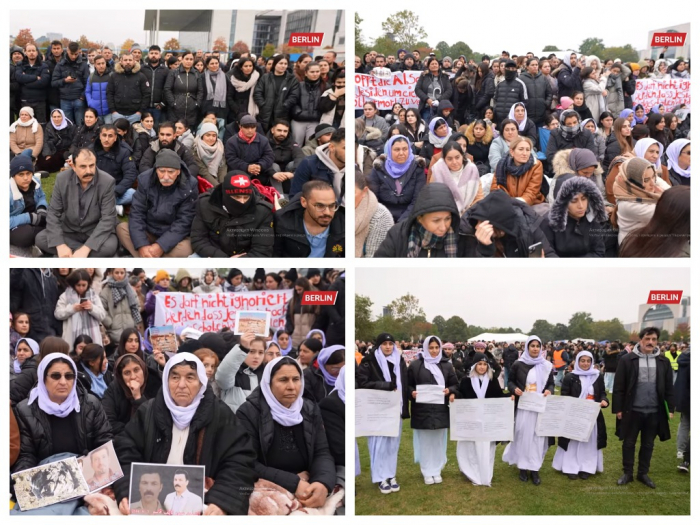Deportation of Yazidis from Germany - Yazidis declared hunger strike

The deportation of Yazidis from Germany is a disturbing development that raises concerns about the safety and well-being of the Yazidi minority. Yazidis are a national and religious minority that has historically been persecuted and genocided. As the world knows, ISIL committed genocide against Yazidis in Iraq in 2014, killing tens of thousands, thousands still in captivity and slavery by ISIL families, and displacing hundreds of thousands.
However, based on the available evidence, the following factors may play a role in attitudes towards Yazidis:
Refugee status. Yazidis, like other refugee groups, have a legal right to asylum in Germany. This means that they cannot be deported to a country where they are at risk of persecution.
International pressure. Germany is a member of the European Union, which has passed a number of resolutions condemning the Yazidi genocide and calling for the protection of their rights. These international pressures may influence German policy toward Yazidis.
Socio-economic factors. Yazidis, like other migrant groups, may face discrimination and inequality in the labor market. This can make it difficult for them to integrate into German society and increase the risk of deportation.
It is unclear why Germany decided to deport Yazidis. Some experts believe it has to do with the recent conflict between Israel and Palestine. Germany is known to be supportive of Israel, and some believe it wants to make room to accommodate the large number of Israelis who may flee Israel because of the conflict.
Other experts believe that the deportation of Yazidis is part of a larger trend of deporting refugees from Europe. In recent years, many European countries have tightened their immigration laws, leading to the deportation of thousands of refugees.
There are several possible reasons why Germany has decided to deport Yazidis, while Arabs and Turks living in Germany are not being deported.
The deportation of Yazidis from Germany has drawn protests from the Yazidi community and human rights organizations. Yazidis claim that their deportation would mean a threat to their lives and safety. They also argue that deportation is unfair given that they are refugees due to genocide.
European leaders should reconsider their decision to deport Yazidis from Germany. Deporting these refugees would mean jeopardizing their lives and safety, and it would be unjust given their history of persecution.
Here are some concrete steps European leaders can take to protect Yazidis:
Revoke the decision to deport Yazidis from Germany.
Grant permanent refugee status to Yazidis in Germany.
Increase aid to Yazidis in Iraq and other countries where they are persecuted.
These steps will help protect the Yazidi minority and ensure their safety and well-being.
Ultimately, the decision to deport Yazidis is a complex and ambiguous one. There are many factors that could influence this decision, and there is no simple answer as to why Germany made this decision.
Tags: #yazidisinfo #newsyazidis #yazidisofgermany
Deportation of Yazidis from Germany - Yazidis declared hunger strike

The deportation of Yazidis from Germany is a disturbing development that raises concerns about the safety and well-being of the Yazidi minority. Yazidis are a national and religious minority that has historically been persecuted and genocided. As the world knows, ISIL committed genocide against Yazidis in Iraq in 2014, killing tens of thousands, thousands still in captivity and slavery by ISIL families, and displacing hundreds of thousands.
However, based on the available evidence, the following factors may play a role in attitudes towards Yazidis:
Refugee status. Yazidis, like other refugee groups, have a legal right to asylum in Germany. This means that they cannot be deported to a country where they are at risk of persecution.
International pressure. Germany is a member of the European Union, which has passed a number of resolutions condemning the Yazidi genocide and calling for the protection of their rights. These international pressures may influence German policy toward Yazidis.
Socio-economic factors. Yazidis, like other migrant groups, may face discrimination and inequality in the labor market. This can make it difficult for them to integrate into German society and increase the risk of deportation.
It is unclear why Germany decided to deport Yazidis. Some experts believe it has to do with the recent conflict between Israel and Palestine. Germany is known to be supportive of Israel, and some believe it wants to make room to accommodate the large number of Israelis who may flee Israel because of the conflict.
Other experts believe that the deportation of Yazidis is part of a larger trend of deporting refugees from Europe. In recent years, many European countries have tightened their immigration laws, leading to the deportation of thousands of refugees.
There are several possible reasons why Germany has decided to deport Yazidis, while Arabs and Turks living in Germany are not being deported.
The deportation of Yazidis from Germany has drawn protests from the Yazidi community and human rights organizations. Yazidis claim that their deportation would mean a threat to their lives and safety. They also argue that deportation is unfair given that they are refugees due to genocide.
European leaders should reconsider their decision to deport Yazidis from Germany. Deporting these refugees would mean jeopardizing their lives and safety, and it would be unjust given their history of persecution.
Here are some concrete steps European leaders can take to protect Yazidis:
Revoke the decision to deport Yazidis from Germany.
Grant permanent refugee status to Yazidis in Germany.
Increase aid to Yazidis in Iraq and other countries where they are persecuted.
These steps will help protect the Yazidi minority and ensure their safety and well-being.
Ultimately, the decision to deport Yazidis is a complex and ambiguous one. There are many factors that could influence this decision, and there is no simple answer as to why Germany made this decision.
Tags: #yazidisinfo #newsyazidis #yazidisofgermany


























